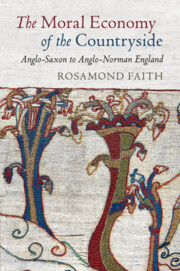Book contents
- Reviews
- The Moral Economy of the Countryside
- The Moral Economy of the Countryside
- Copyright page
- Contents
- Preface
- Abbreviations
- 1 Introduction: The Moral Economy
- Part I Rank
- Part II Reciprocity
- Part III Reputation and Witness
- Part IV The Wolf Sniffs the Wind
- Part V The Aftermath of Conquest
- Part VI In the World of the Manor
- 13 Establishing Custom
- 14 Thinking Feudally
- 15 From Rank to Class
- 16 Conclusion: Forward into the Past
- Appendix The Family Farm in Peasant Studies
- Bibliography
- Index
13 - Establishing Custom
from Part VI - In the World of the Manor
Published online by Cambridge University Press: 25 October 2019
- Reviews
- The Moral Economy of the Countryside
- The Moral Economy of the Countryside
- Copyright page
- Contents
- Preface
- Abbreviations
- 1 Introduction: The Moral Economy
- Part I Rank
- Part II Reciprocity
- Part III Reputation and Witness
- Part IV The Wolf Sniffs the Wind
- Part V The Aftermath of Conquest
- Part VI In the World of the Manor
- 13 Establishing Custom
- 14 Thinking Feudally
- 15 From Rank to Class
- 16 Conclusion: Forward into the Past
- Appendix The Family Farm in Peasant Studies
- Bibliography
- Index
Summary
This chapter questions whether FitzNigel’s account of negotiated agreements is a credible description of the situation of peasants vis-à-vis their lords. It does so by looking at estate policies. Pre-Conquest surveys show categories of people whose livelihood depended on their working on a landowner’s inland and whose forebears and descendants were similarly dependent. Twelfth-century surveys show landowners beginning to require a record of what they could expect from named individuals among the rest of the peasantry. These documents were frequently headed by the names of jurors who had sworn to their veracity so obligations were now legalised. The detail in which they were recorded show that ‘custom’ was not what had been the case ‘from time immemorial’, but what had been negotiated and agreed to be owed from what was now a ‘tenement’.
- Type
- Chapter
- Information
- The Moral Economy of the CountrysideAnglo-Saxon to Anglo-Norman England, pp. 171 - 183Publisher: Cambridge University PressPrint publication year: 2019

